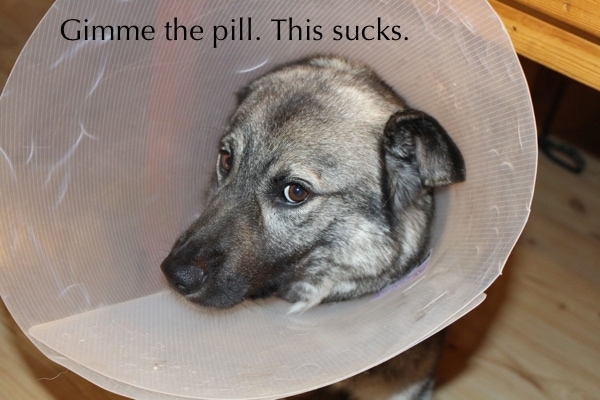Does Baby Oil Listerine and Water Work on Dog Mange
Part One: A New Wonder Drug for Itchy Dogs?
When you have a crazily itchy dog or cat, everybody suffers. Patients in this state often keep you up at night and drive you crazy during the day dealing with the mad itch.
Scratching, biting, losing hair, skin red and inflamed, these guys often stink, ooze sticky moisture from their skin, and many can't get comfortable long enough to take a decent nap, let alone sleep the night through.
Talk about a pain for you and your loved ones!
At the base of wildly itchy animals is the immune system, which is working overtime, but malfunctioning.
"Dysregulated" is a term used in the scientific papers.
(We have to insert a wink here because immune system dysregulation is entirely a manmade disease. More on that later.)
Interestingly, most look right past that important manmade point and seek to "fix" the itchy beast with powerful drugs.
Enter the latest anti-inflammatory drug to make a splash in the veterinary market: Apoquel (oclacitinib).
And lest you think I'm recommending it, you'll want to read on for the details about why an abundance of caution is recommended before you plunk down your hard-earned money and start your dog down a potentially dangerous path.
Apoquel is not for puppies. Or cats or people. It's Apoquel for dogs that we're talking about.
Born from the loins of the world's largest drugmaker Pfizer, their former division Zoetis is now the "animal health" giant that brought this much-touted wonder drug to market in 2014.
How big is Zoetis?
$4.34 billion in revenue in 2012, before Apoquel had even hit the market.
So: BIG.
Stops Itch FAST!
The claims and even the actual results in itchy dogs are amazing.
Provides onset of relief within 4 hours. Effectively controls itch within 24 hours."
Irresistible, right?
After you've lost sleep for weeks on end and tried everything offered you by Dr. WhiteCoat and Dr. Google without success, wouldn't this sound like heaven in a pill?

Apoquel sold like hotcakes when it first appeared. Interestingly, there was quickly a shortage in supply, so the demand was heightened even further, as desperate dog owners sought vets who had some.
"We'll buy any size you've got, we'll cut the giant breed size to work for our Chihuahua, we just NEED TO GET THIS ITCH UNDER CONTROL!"
One might surmise that shortage was intentional, but that's beyond the scope of this article.
The company's research and the experience of many dog owners corroborate this: this wonder drug stops itching almost immediately.
Apoquel: How Does it Work?
Ah, now you're asking a smart question. I love it when you do this.
How Apoquel works is the key to why you need to be smart.
Smarter than the marketers, smarter than Zoetis, and smarter than Dr. WhiteCoat, who'd be tickled to sell this to you.
(He, like me in the old days of conventional medicine, hasn't likely read the research on safety or efficacy. He's just taking his Zoetis rep's word for it: it works! But guess who did the research… and for how long? A: Zoetis! 30 days!)

Pull up a little closer to the campfire for this part, because here's where the story gets good.
Why is my Dog so Damned Itchy??
To know how the drug works, you should know first how The Itch works.

Here's what a board-certified veterinary dermatologist says causes The Itch:
- Flea allergy dermatitis
- Atopic dermatitis
- Food allergy dermatitis
- Contact dermatitis
- Sarcoptic mange
- Demodectic mange
Source
I really, really wish I was making this up. (He's merely listed itchy diseases, nothing about their causes).
But, while that explanation is seriously lacking in the "why?", the part he does get right is this:
That's been true for about 15 years now. Hard insurance data tell no lies.
Remember that wild and crazy immune system, spoken of earlier? The one that's off the rails, acting all whacky and dysregulated?
That's what Apoquel is acting on. It's being called an "immune modulator" by the experts.
That's an enticing way of calling out its action.
Sounds suspiciously benign.
Keep reading though, and you'll see that it's anything but.
In Part Two, I go into how that dermatologist really missed the larger point of what causes itch. And how to work to truly prevent this maddening disease from wreaking havoc on your own animals. As you might guess, prevention in a real sense will trump giving a drug to try to control this painful disease.
For now, here's a brief description of how this "wonder drug" called Apoquel works.
Immunology 101
First, an important understanding. While it might seem like we know a lot about the immune response, there are still large swaths of mystery we don't yet comprehend.
By its very nature, this is one complex system! If we didn't have it, we'd have been lost as a species a very long time ago, right along with our pets and our livestock.
That said, we know there are lots of messenger molecules involved.
And sweeping events called cascades, where the right trigger (a virus, say) causes a series of chemical messages and events that, when all is working well keeps you and your animals out of harm's way.
"Yo. We Need to Talk"
One group of immune messengers are called cytokines.
These small molecules are produced by a wide variety of cells, and they signal other cells to do something like come to the scene of infection, let loose their chemicals, take part in signaling others, dump antibodies, etc.
You've likely heard of some cytokines before.
- Interferon
- Interleukins
- Tumor necrosis factors
When inflammation is triggered, these chemical messengers call in the troops. It's time to heal!
(More on inflammation in context here. It's not the enemy, by the way.)
Enter Apoquel (Oclacitinib)
A couple of words hidden in those names. A whole class of inhibitory compounds man has invented have "inib" at their end. Short for inhibit.
And "quel?" You get that one.
Chill out this hot mess of inflammation!
So, this drug seeks to stop a piece of the inflammatory chemical cascade by interfering with certain enzymes called kinases, or JAK in the literature, which stops some cytokines from doing their thing.
And it works!
But like all things that "work," we need to look a bit deeper if we want to raise truly Vital Animals. "Work" can mean cure but it more often means palliation:
Palliation means, while the medicine is being given, the symptoms are relatively controlled. The animal is no better overall and once the drug stops, the symptoms return. In the meantime, the disease is slowly growing and getting less likely to be able to be cured.
Usually, there's a price to pay in long term health when we interfere with Mother Nature, and this drug is no exception.
Apoquel and Long Term Safety? Not So Much.
My Texas colleague Dr. Ron Hines has done a brilliant job of cataloging feedback from animal owners actually using this drug.
You, dear readers, have also contributed many, many of your own experiences in the comments on this article.
When you read past the glowing reports of "Hallelujah! Peace at last!" you start to pick up a theme.
Those who've been using this drug for a while are seeing two common problems. Variations of these occur in most all drugs, in fact, not just this one:
- Side effects
- No longer helping as much as it did at first.

Here are a few real people, real dog problems I highlighted. You'll see more if you dig further.
[8 months on the drug, Bishon]
The drug has given my dog (four years old) a quality of life I never thought was possible. He also receives an allergy serum injection every ten days. However, for the past several weeks his nose has been running constantly and as of late he has been gurgling rather than breathing. Two days ago, his nose was bleeding. I stopped the Apoquel immediately and will see the allergist this week. Most importantly, two days after I stopped the Apoquel, his nose dried up, no more running and no more blood. I cannot help but assume that the Apoquel was the cause of his misery."
[6 mo. on the drug, Mini Dachshund]
She has gained almost 3 pounds, and has become very yeasty and smelly. She also has pain going down stairs and playing. In reading about Xeljanz (a human variation of Apoquel) in an advertisement in a magazine, I noted that this drug is an immunosuppressant. Yes it works for the itching, but I am concerned about the changes in her health since taking this drug."
[1 year on the drug, Mini Schnauzer]
Curly has just been discharged after 4 days in the hospital. He was hospitalized due to a mysterious 105ºF fever, lack of appetite, huge papilloma lesions in his mouth, vomit,and abdominal pain… It worked only in the beginning, and now it barely provides some mild relief to his itch; he chews his paws raw and now his face and legs and tummy itch a lot, too…
So here is our challenge: It seems that Apoquel has greatly contributed to weaken Curly's immune system to the point that his platelets and also his red blood cell count is considerably low. At the same time, he is experiencing very little relief by taking it. The internist believes that continuing the Apoquel any further (would) wreak havoc in his immune system, that we can only expect more papilloma lesions, further inflammation of his lymph nodes, lower platelet cell cell count and so on."
Also of note, this drug is not labeled for cats. Or pups under 12 months old.
Hmmm. What are they telling us in between the lines here?
Can Apoquel Cause Cancer in Dogs?
Before I share some real dog, real people experiences on that, let's make sure you are aware of something.
Did you know that, for decades now at least, immunologists have known that you and I and every animal on the beautiful blue planet are making "mistakes" in our cells every day?
They are called mutations.
Mutations happen during cell division, which is pretty much a non-stop process in a living being. When you've worn out a liver cell or you've got to knit a cut back to normal closed skin, it's cell division that makes this possible.
But, like all biological systems, cell division isn't a perfect process.
Some "oopsies" happen, and the copy comes out wrong.
Some mutations are harmless, some, when certain genes are involved, cause runaway cell division way past what's necessary.
The result? Tumors.
Tumor cells are in me and you and your dog right now
The understanding of those steeped in immunology is that it's our immune system that is the sole reason every mutation that starts running wild in cell division doesn't create cancer.
The third process is referred to as tumor immune surveillance, whereby the immune system identifies cancerous and/or precancerous cells and eliminates them before they can cause harm. The idea that the immune system, which so effectively protects the host from microbial pathogens, might also recognize and destroy tumor cells was first discussed over a century ago and has recently been reviewed in detail
source: https://www.ncbi.nlm.nih.gov/pmc/articles/PMC1857231/
We likely have regular battles waged on cancer cells that never become tumors.
Why?
Our immune system correctly "saw" these cells as foreigners.
And called in the guard, like white blood cells, complement, interferon, natural killer cells, etc.
And like those kinases, known to be great communicators that help coordinate the attack on the wayward cells leaning towards becoming cancerous.
What's Apoquel good at?
Taking out some of those kinases, remember?
Is an immune communication breakdown possible, when we mess with the kinases?
I'd bet on it.
And, it's as if Zoetis never got the memo about how important our immune system is to prevent cancer:
APOQUEL may increase the chances of developing serious infections, and may cause existing parasitic skin infestations or ** pre-existing cancers** (emphasis mine) to get worse. — company literature
Pre-existing cancers?
Isn't that what we've known about for all these decades?
They are ALL pre-existing until they get a green light to grow, aren't they?
Let the Apoquel Dogs Speak
Here's a handful of the many comments that say that's likely far better than I could:
Linda, young German Shepherd
My 4 year old gsd was on it for itching. She died 2 months later with lymphoma
Carley, 7 year old Aussie Shepherd
Do either of your dogs have hard lumps in their lymph nodes? Unfortunately my dog was diagnosed with lymphoma after using apoquel. I'm in the process of collecting more data if there is a connection because my vet brought it to my attention (not the vet that prescribed the apoquel) my dog is a 7 year Australian shepherd lab mix and has been completely healthy and happy minus his allergies. In comes the apoquel and then the lymphoma it's hard to not think it is related
Dan, Bedlington Terrier
Our dog (Bedlington) had horrible grass allergies. He would scratch himself bloody. We put him on Apoquel because he could not sleep from all his scratching. It was a wonder drug and his itching stopped after 24 hours. His coat came back, and he was a new dog. 2 months later he had a benign cancerous skin lesion on his nose that had to be removed. Wish we had connected the drug to that problem. 4 months after that he developed squamous cell carcinoma in his lower jaw and died 3 months later.
Bruce M, Boxer
My sweet boxer Daisy turns 5 in 10 days. She has had allergies for virtually her entire life, and we have tried a variety of diet changes and treatments. She got a prednisone shot in May, and it lasted about 3 weeks. A clerk at the vets office said they could give us "something" in a pill form, and it would last longer and has proven to be very effective. It's a very good vet practice, so we trusted them completely.
On June 23, I began to give her the "pill". It was apoquel. Within a week, the lymph nodes under her jaw began to swell. Took her to the vet the next week, and the needle aspiration was inconclusive. It turns out her lymph nodes were swollen behind her legs as well. They did a biopsy, and we were informed today that she has lymphoma. She also defecated pure blood today.
I asked the vet, "did apoquel expedite the cancer that was in her body"? He said "yes", because it compromised her immune system and allowed the cancer to take over.
Too Good to Be True? I'd Put Money On It.
So, a big caution here, as with all "miracle" drugs.
If it's interfering with your dog's immune system, and running out of gas after a certain period of use, is there any hope that it will cure your dog's itch?
Of course not.
As you've learned, if you've followed along for any length of time, drugs never cure chronic disease.
They cannot.
Want more? I've got a Free Report for you outlining alternatives to Apoquel that work without negative side effects. Click the button and grab yours now:
Free Download (Click Here)
In Part Two of this series, we look at the real causes of The Itch, and immune dysregulation.
Neither of these fell from the sky and happened to land on your poor innocent dog, as you likely have guessed.
Tell us in the comments below if you've had any experiences with this "wonder drug" called Apoquel.

Does Baby Oil Listerine and Water Work on Dog Mange
Source: https://vitalanimal.com/apoquel-dog-1/
0 Response to "Does Baby Oil Listerine and Water Work on Dog Mange"
Post a Comment